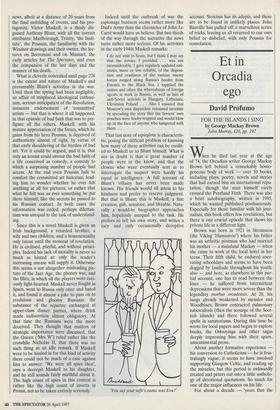Et in Orcadia ego
David Profumo
FOR THE ISLANDS I SING by George Mackay Brown John Murray, 176, pp. 192 Wen he died last year at the age of 74, the Orcadian writer George Mackay Brown left behind a remarkably homo- geneous body of work — over 50 books, including plays, poetry, novels and stories that had earned him an international repu- tation, though the man himself rarely crossed the Pentland Firth. There was also a brief autobiography, written in 1985, which he wanted published posthumously. Especially for those familiar with his jour- nalism, this book offers few revelations, but there is one crucial episode that shows his private life in a different light.
Brown was born in 1921 in Stromness (the Viking `Hamnavoe') where his father was an arthritic postman who had married his mother — a mainland Mackay — when she came to work at the local hotel in her teens. Their fifth child, he endured ener- vating schooldays and seems to have been dogged by lassitude throughout his youth; also — and here, as elsewhere in this par- tial account, one has to read between the lines — he suffered from intermittent depressions that were more severe than the legendary morbus orcadensis. At 20, his lungs already weakened by measles and Woodbines, Brown contracted pulmonary tuberculosis (then the scourge of the Scot- tish islands) and there followed several spells in sanatoriums. During this time he wrote for local papers and began to explore books, the Orkneyinga and other sagas deeply impressing him with their spare, unsentimental prose.
About another formative experience his conversion to Catholicism — he is frus- tratingly vague; it seems to have involved supporting Glasgow Celtic, and reading up the miracles, but this period is awkwardly treated and peters out into a little antholo- gy of devotional quotations. So much for one of the major influences on his life.
For about a decade — 'years that the locusts ate' — he was a layabout, living alone with his mother in a council house, writing the odd story, consorting in bars with his `Stromness chorus of drinking friends'. There is hardly a glint of the bard to come. He is surprisingly frank about the ambivalent role of John Barleycom in his life, which seems to have led to some close scrapes. But in the later fiction it is often alcohol's positive aspect which appears: `For Jock the whisky made beautiful the mystery of life and death' (The Wood- carver). Try that out on your GP.
Then, in 1951, 'out of boredom' the list- less Brown joins an evening class, and is accepted as a student at Newbattle Abbey, an adult education college in Dalkeith where the Warden was Edwin Muir, a fel- low Orcadian. At this juncture the chrysalis is torn, and the book begins to quiver into life. He meets kindred spirits. After a deal more carousing, he goes to read English at Edinburgh. There, whilst hobnobbing with the poetic coterie of the Rose Street bars, he forms a passionate attachment that was evidently the crux of his entire life.
If For the Islands I Sing seems hitherto flat by comparison with Brown's imagina- tive writing one should not be amazed; he was never at ease in the confessional mode, and thought there was `too much emphasis on the life and personality of authors' (the art that intrigued him was what Mann called the 'anonymous and communal'). But on one point he was determined to set the record straight: Stella Cartwright, a photographer's beautiful receptionist, became his inspiration. Though typically vague about details, he is emphatic about her historical importance for his group. `She wrote nothing herself, but what she truly was, her rare lovely unique essence, is a part of the literature of Scotland', he says, with no sign of that insular penchant for understatement. Somehow their affair hit the rocks, and shortly thereafter, he returns to Orkney, and a comparatively austere and solitary life for more than three decades. But nearly all his books were still to come.
Perhaps understandably, at this point the power surge disappears from his autobiog- raphy and he begins to close down. We learn little about his literary career (nur- tured initially by the redoubtable Nora Smallwood), though there are odd glim- mers about composition (for instance, the heptahedral shape he favoured) and an appendix about growing old. For intimate glimpses of the man himself we still have to look at the weekly diary columns he wrote for The Orcadian — his last collection was published as Rockpools and Daffodils where the wavebeat of his distinctive style is perhaps closest to the swell of his life. George Mackay Brown had a gift for cele- brating the ordinary: 'It is remarkable that in modern literature it is the common man who holds the rarest treasures.' By all accounts but his own, he was an extraordi- nary man.



































































 Previous page
Previous page